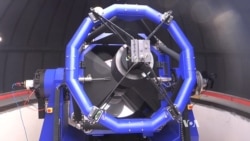Two optical telescopes are the latest means through which Ethiopia aims to use space technology to further the country's development.
The observatory is fully functional, and soon it will be fully operated by Ethiopia's own engineers. Astrophysicist David Buckley and other scientists have been in Ethiopia for weeks to test the telescopes and make sure everything is in line with international standards before handing it over to Ethiopia.
“We check that the stars are very sharp, in focus, there’s no distortion across the images, that there’s uniformity across the whole field of the telescope," said Buckley, who is head of astronomy operations at the Southern African Large Telescope near Sutherland, South Africa. "And then the second, probably most important attribute of the telescope is how well it points to an object.”
Building the telescopes and the observatory took three years. The cost of the telescopes alone was almost $3 million.
Dr. Solomon Belay, director of the Space Observatory, said the project was worth the cost because space technology will contribute to the development of Ethiopia — "for example, in agriculture, data processing, crop production and modernizing of the agriculture industry. And in the energy sector and fossil exploration of mining, energy. And in the telecommunication sector.”
The observatory was built 20 kilometers outside the capital, Addis Ababa, on top of Mount Entoto and 3,200 meters above sea level. At that altitude, wind speed and humidity are low and cloud cover is minimal.
There are about 30 graduate students, five engineers, and 20 permanent and adjunct professors. Engineers like Ghion Ashenafi will spend many nights in the observatory, because that is when they can actually use the telescope to study the universe.
"We take the spectrum of the stars, we analyze them," he said. "We’ll know what the universe is all about, what we came from and what probably our destination will be, and we can also analyze our atmosphere and generally the aspects of our solar systems.”
While this is only the start of Ethiopia’s space program, the observatory has big plans. Ethiopia’s observatory promises free access to African students and researchers to promote African space development.
And Belay is clear about what he wants to reach with the observatory in the next five years: “Ethiopia is going to launch its own satellite, built by Ethiopians and launched by Ethiopians.”





